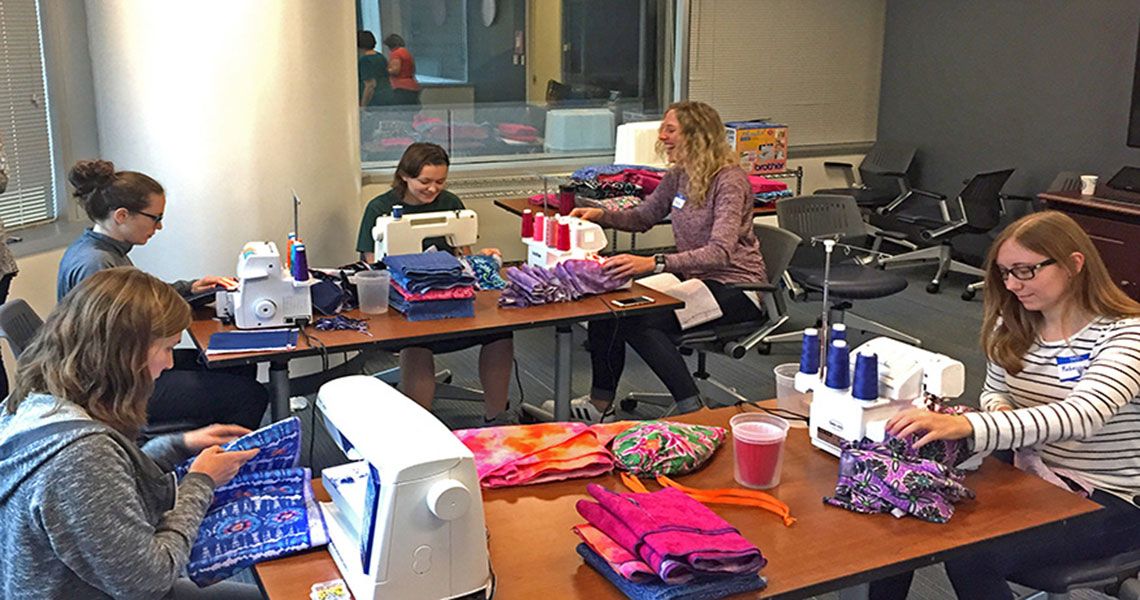Physical therapy students from the George Washington University (GW) School of Medicine and Health Sciences (SMHS) Physical Therapy (PT) Program found meaning from helping others both in their community and abroad during the 2017 International PT Day of Service.
This year, students and faculty helped two very different nonprofits that hold very similar values: helping others gain greater independence.
The first organization, Days for Girls, provides sustainable menstrual kits and health education to girls and young women around the globe. The kits provide not only a needed resource, but also ensure a girl can remain in school during the time each month she would have stayed home managing her menstrual period. To help the nonprofit, SMHS PT students and faculty members, a handful of GW alumni, friends, family, and Howard University PT students, gathered on GW’s campus to sew and package the kits.
Holly Jonely, PT, ScD, assistant professor of physical therapy and health care sciences at SMHS, helped spearhead the service day initiative with assistance from the Day’s for Girls Rockville, Maryland, chapter, as well as efforts from Jill Boissonnault, PhD, PT, associate professor of physical therapy and health care sciences at SMHS, and two second-year PT students, Hannah Kimberly and Mandy Dunyak.
The kits included hand-sewn bags that contain reusable underwear liners, three pairs of underwear, a wash cloth, and a bar of soap. For Kimberly, it had been years since she sewed something, but despite being a bit rusty at the craft, she said she had a great time stitching the kits.
“It was meaningful to see the process from start to finish and to see how much work goes into actually making the kits,” she said. Kimberly was joined by about 100 other participants, who all together made more than 50 kits in about six hours.
While creating the kits didn’t require the students to put their PT knowledge to use, added Kimberly, it was a really special experience for them. “I think it’s really important for us to not always be completely PT-centric, and as PT students it’s very easy to be,” she said. “It was interesting to branch out of that and do something that a lot of us haven’t done before, and to help women who need it.”
Dunyak added that knowing the girls would not only receive the kits, but would be educated about their health, was important to her. “A lot of the girls in these countries may not understand why they have [menstrual] periods,” she noted. “Days for Girls is all about education so the girls understand what is going on with their bodies.”
Dunyak added that as a PT, if she treats patients once and sends them away without explaining what she did to help them, the impact won’t last. “As PTs, we learn that patient education is an important thing in terms of having sustainable results … so for these girls, having education about what’s happening to their bodies, that’s what’s going to keep them healthier longer,” she said.
Just across the D.C. border, in Gaithersburg, Maryland, another group of PT students helped greet visitors to local nonprofit Equipment Connections for Children and assist the PTs there. The organization, explained PT student Abigail Glick, collects donated medical equipment for children with disabilities.
SMHS PT students helped the nonprofit welcome families, clean equipment, and fit children for needed devices.
“We haven’t had a pediatric course yet, so I got to see a lot of the equipment that is used for that population,” Glick said. “A kid might walk in holding his parents’ hands for support, but then he’d get fit for a walker and you could see him smiling. I could see the impact it had on the families and kids.”
Glick added that exposure to such volunteer opportunities is invaluable. “When I become a physical therapist, I’ll know these organizations exist and I can take advantage of them,” she said. “I really enjoy how much GW advocates volunteering for its students; I think it’s really rewarding.”



